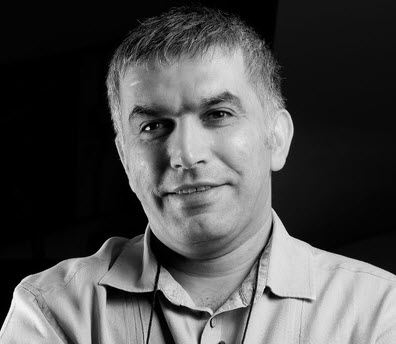19 November 2017 – Today the 17th hearing of the “Twitter” trial of Bahrain’s most prominent human rights defender Nabeel Rajab was adjourned to 31 December for a technical report about the contents of his laptop after his arrest.
Rajab faces up to 15 years in prison on charges related to his tweets exposing torture in a Bahraini prison and criticising the humanitarian cost of the war in Yemen.
In today’s hearing the court for the second time called on the Ministry of Interior employee who prepared the so-called technical report about the Twitter account from which the tweets in question were posted. As he did last December, the said employee was unable to present any further evidence. He re-confirmed that he is still unable to give any evidence regarding the IP relating to the tweets in questions.
Despite the Public Prosecution’s failure to provide any incriminating evidence against Rajab, the court continues to chase evidence against him and today requested to call on the officer who confiscated Rajab’s electronic devices for another case to be examined for this case. This request was granted and the trial was adjourned to 31 December to call on the Ministry of Interior officer who examined the content of Rajab’s laptop after his arrest. It is not expected to be the last hearing.
The court had another witness from the criminal investigation directorate (CID) who was not brought forward, though the reason for this was unclear. Rajab was bearded and in high spirits.
In September 2017, a new set of charges was brought against Rajab related to social media posts made in January 2017, when he was already in detention and without internet access. Rajab also faces a fourth set of charges related to a letter he penned to the New York Times in September 2016. In July 2017 he was sentenced to two years in prison for “spreading false news”, the appeal of which is expected to conclude on 22 November 2017.
Sayed Ahmed Alwadaei, director of advocacy at the Bahrain Institute for Rights and Democracy, said: “Bahrain’s horrific rights record has hit a new level after being blacklisted by the UN for being part of the Saudi-led coalition in Yemen. Persecuting Nabeel for advocating peace is heinous crime added to the catalogue of abuses by Bahrain’s rulers, The continued; unethical support of the UK and the US to Bahrain fosters the culture of impunity.”
Rajab was transferred from the Manama Fort hospital to Jau Prison on 25 October 2017. On arrival he was immediately mistreated, subjected to a humiliating physical search, shaved against his will, and endured the confiscation of all his personal effects including books, cloths, toiletries and his shaving set. He is now kept with another 5 prisoners in a very small cell of no more than 3×3 meters.
He is undergoing continuous deprivation of his essential rights at Jau Prison. He is denied any books, his medical pillow and the cotton clothing provided by his family despite being allergic to the synthetic cloth provided by Jau Prison.
Rajab also complains of a poor, insufficient diet; he is not allowed to visit the prison canteen to buy snacks and is allowed out of his cell for no more than one hour each day. A formal complaint to the Ombudsman has already been made but with no positive results so far.
Rajab, the founder of President of the Bahrain Centre for Human Rights, was arrested on 13 June 2016 and has been detained ever since. He was held largely in solitary confinement in the first nine months of his detention, violating the UN Standard Minimum Rules for Non-Custodial Measures (Tokyo Rules) which state: “pre-trial detention shall be used as a means of last resort in criminal proceedings, with due regard for the investigation of the alleged offence and for the protection of society and the victim.”
In early April 2017, Rajab was admitted to the Bahrain Defence Force hospital for a necessary surgery. He was transferred back to police custody just a day later, before having recovered from his operation, and his health deteriorated significantly; from there he was transferred to the Ministry of Interior Clinic (Al-Qalaa), where he remains to date. Between April and August 2017, Rajab was unable to attend court, which held numerous hearings in his absence, including his sentencing. Rajab was transferred back to Jau Prison in October.
The UN Committee Against Torture has called for Rajab’s release.
The UK Foreign Office stated: “We continue to closely monitor the case of Nabeel Rajab and have frequently raised it with the Bahraini Government at the highest levels. The UK Government continues to emphasise the need to respect the rights of all citizens, including freedom of expression.”
In the US, the Trump administration this year removed Obama-era human rights conditions on arms sales, one of which was the unconditional release of Rajab. In September, the Trump Administration approved the sale of F-16 jets worth $3.8 billion.




